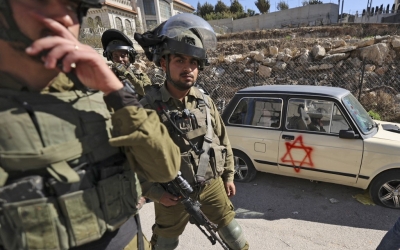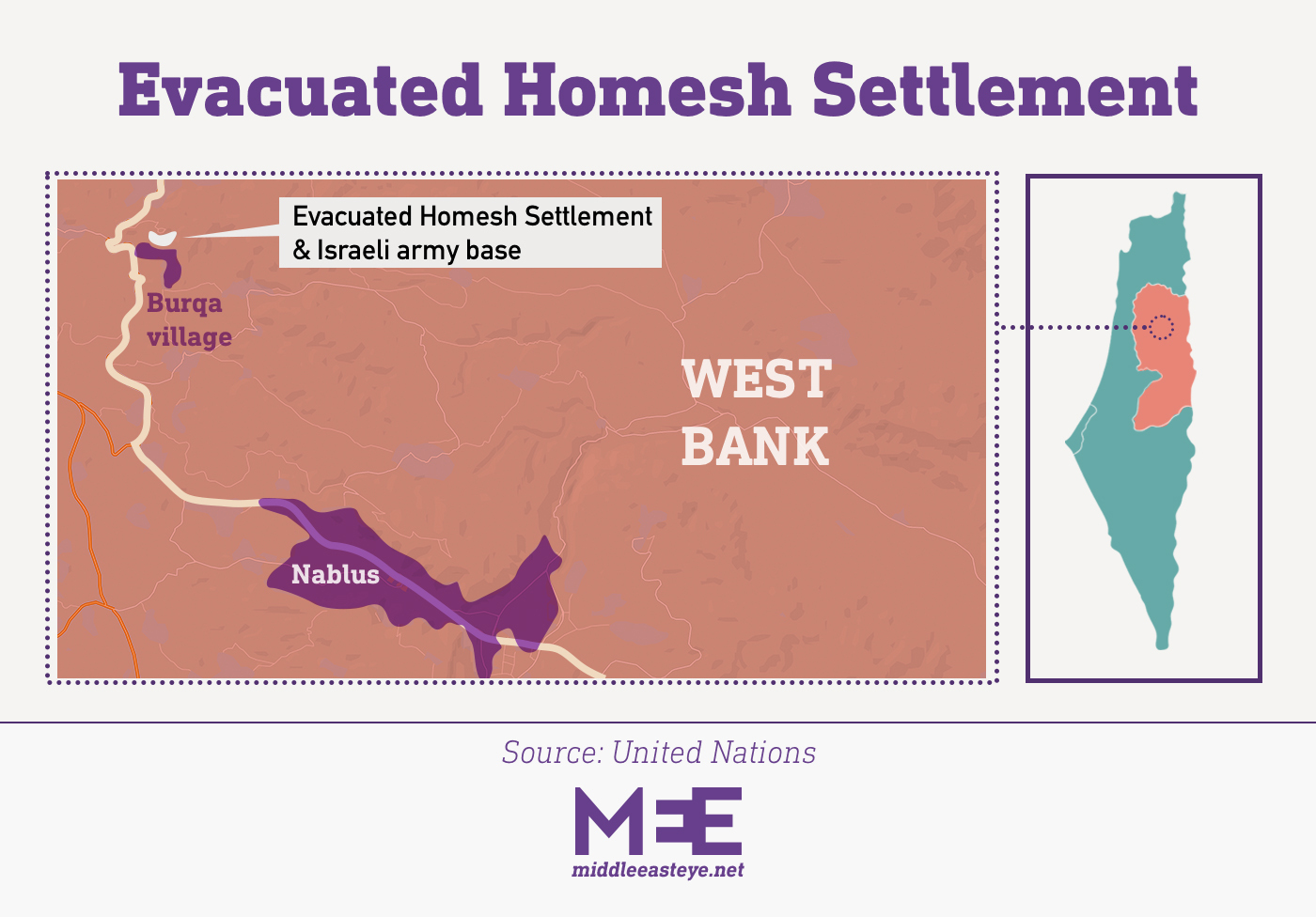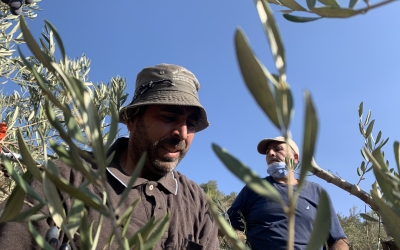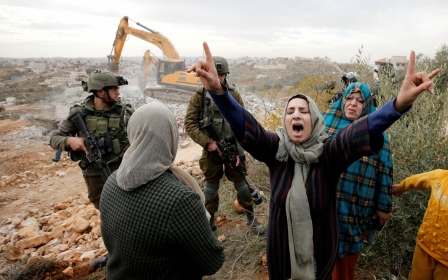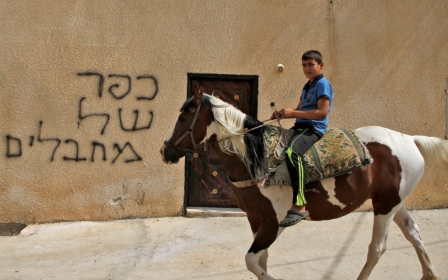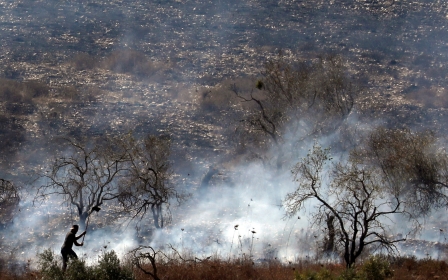Rising settler violence against Palestinians in Burqa reignites struggle over land
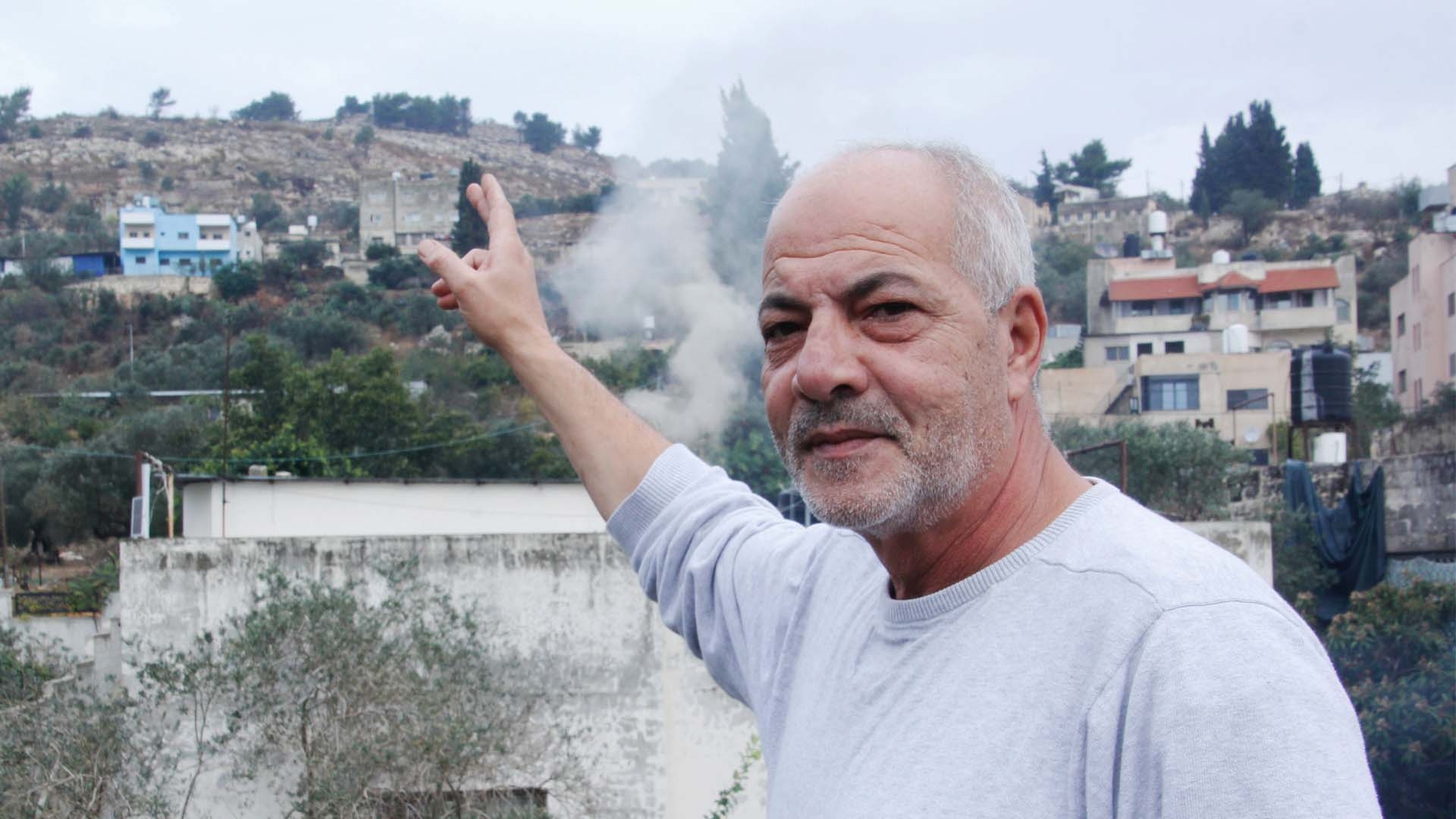
Perched atop the roof of his home in Burqa village north of Nablus in the occupied West Bank stands Mushir Seif, gazing across the Mount of al-Zuhur at his land, now swallowed up by the Israeli settlement of Homesh.
The land is only 800 meters away from him, and 10 minutes away by foot, yet for over four decades he’s been denied access to it.
Seif and his 6,000 fellow Burqa residents have not been able to reclaim or plant anywhere in the 45 dunams (45,000 square metres) of their land that have been confiscated by Israel since 1978 when Homesh was established.
With a mixture of sadness and bitterness, Seif told Middle East Eye of the pain he and his fellow villagers have felt for decades due to the settler presence on the land - with the tacit support of the Israeli army - and the persistent feeling of insecurity caused by settler violence.
“It was an ambush by the settlers,” Seif told MEE about one near-fatal attack that he and other villagers came under last November.
“The army was conspicuously absent and did not come even after the attack,” he added.
The incident Seif referred to happened on 15 November when a group of Burqa residents was on their way to visit their stolen land. When they arrived, Homesh settlers shot at them, assaulted them with sharp objects, and destroyed Seif’s car. At least six farmers were seriously injured.
The November assault was not an isolated incident. Palestinians in Burqa fear that settlers are ramping up violence to create a new reality on the ground and force the government to give them the land.
Attacks increased particularly after the killing of an Israeli settler by Palestinian gunmen in December near Homesh, bringing the decade-long fight over land in Burqa back into the spotlight.
Struggle through the generations
The plight of Palestinians in Burqa started in 1978 when Israel confiscated 1,050 dunams from Mounts al-Zuhur and al-Qubaybat in the village to establish a military base.
The military outpost was soon transformed into what is known as the Homesh settlement, whose radius of control extends to 4,000 dunams.
In 2005, the Israeli government under Ariel Sharon evacuated settlers from Homesh, along with settlers in the Gaza Strip and five other settlements and military bases near Jenin, as part of its unilateral disengagement plan.
Since then, the army has closed off the area for the Palestinians that owned the land while settlers continued to come back to maintain their presence, establishing a makeshift yeshiva, or religious seminary, in contravention of Israeli law.
From 1978 up to the present day, the tussle between settlers and the Palestinians who own the land has been ongoing, a struggle passed down from grandparents to grandchildren.
Such is the case of the family of Yousef Hajji, known as Abu Saleh, who was expelled by the army while tilling the land 44 years ago. Abu Saleh passed away in 2005 aged 91 before he could return to his property.
His son Fathallah, 72, faced a similar situation a few years ago when he tried to plant trees on the land and was expelled by Israel. Now, the same fate has befallen his grandson, Nasser, who was wounded in the settler attack in November.
Standing beside his son, Nasser, as he received treatment for his wounds at the Rafidia Surgical Hospital in Nablus, Fathallah told MEE that Nasser had gone with dozens of his fellow villagers to visit and plant the land.
The visit was arranged to comply with a request by the Israeli High Court, which asked for proof that demonstrates the villagers' inability to access the land due to settler attacks.
'When we were ambushed, the settlers attacked us from behind and from the front, and the army was nowhere to be found'
- Munir Qadus, Yesh Din
Settlers and the army had testified in front of the court saying farmers do not ever visit the land and hence cannot lay claim to it.
The attack was not the first of its kind in Burqa, Fathallah said, but it was the most violent.
About 50 settlers had been lying in wait for them and attacked them with sharp objects once they approached the land.
Munir Qadus, a field researcher with the Israeli human rights organisation Yesh Din, was one of those assaulted on the day when his phone was broken and his glasses were lost.
“We waited for over 15 minutes for the army to arrive to secure the entrance of the farmers to their lands, despite the security coordination from the side of the Palestinian Authority (PA),” Qadus told MEE.
“When we were ambushed, the settlers attacked us from behind and from the front, and the army was nowhere to be found.”
About 50 similar settler attacks were documented in 2020 alone, Qadus said, which included beatings, attacks on homes, and stone-throwing against Palestinians passing by in their cars.
Court orders ignored
In 2013, after many lawsuits filed by the farmers, the Israeli High Court ruled that Homesh was a private Palestinian landholding belonging to its farmers and that an Israeli presence there was not permissible.
In breach of the court order, settlers maintained a de facto outpost on the lands.
Burqa residents have been able to enter their lands at times since 2018, but only fleetingly and without planting anything.
On the rare occasion that they could plant certain trees on the lands through aid and charitable organisations, settlers would promptly uproot them and fill the water-wells with rocks.
Jehad Salah, former head of the Burqa Village Council, told MEE that the only reasonable explanation for the settlers’ continuing presence in Homesh is the implicit approval of the army and government.
Qadus accuses the government and the army of negligence in implementing the law, asserting that neither the settlers nor the army abides by the court order, which is the highest legal body in Israel.
“They think that all of the land is Israeli land,” Qadus said.
Settler attacks on Palestinians across the occupied West Bank have seen an “alarming” rise in 2021, UN human rights experts said in a statement last year.
“We are witnessing the highest recorded levels of violence in recent years and more severe incidents,” the statement said.
According to UN figures, 370 settler attacks led to damage to property in 2021 and a further 126 assaults caused casualties.
At the same time, settlement building has tripled from the previous year, with the approval of the construction of 4,000 new units, according to Khalil al-Tafkaji, a Palestinian expert on settlement and director of the map unit at the Centre for Arab Studies in Jerusalem.
Both authorised and unauthorised Israeli settlements on occupied Palestinian land are considered illegal under international law.
'We will not leave the mountain'
Following the shooting near Homesh that left one settler dead and two wounded on 16 December, settlers unleashed a wave of attacks that have affected most of the village’s residents.
Dozens of houses have been assaulted and their windows and doors broken, threatening the lives of many villagers. Gravestones were not spared the onslaught and many of them were vandalised and defaced.
Saddam Salah, an anti-settlement activist in Burqa who regularly documents the violations on his camera, says at least 30 houses in Burqa were attacked in the three weeks after the December shooting. Settlers also used live bullets while attacking Palestinian homes, he said.
The situation has been exacerbated by the army’s crackdown on the village.
Military checkpoints have been erected around Burqa and its entrances have been blocked, leaving some neighbourhoods completely sectioned off and isolated.
A resurgence of popular resistance has emerged in Burqa in recent weeks and there have been protests against the deplorable conditions perpetrated by the army and the settlers.
At least eight Palestinians have been injured by live bullets in demonstrations against the Israeli assaults, and hundreds more by rubber-coated steel bullets and tear gas.
Despite the soaring tensions in Homesh, the settlers continue their calls to “climb the mountain [of Homesh],” refusing to give up their position, citing religious reasons.
But the people of Burqa, the rightful owners of the land, promise that they will not remain silent.
With their oft-repeated slogan, “we will not leave the mountain,” they have created a counter popular resistance movement, alongside nearby villages of Beita and Kufr Qaddum, promising to protect their land and push back against turning Homesh into an Israeli settlement once more.
Middle East Eye delivers independent and unrivalled coverage and analysis of the Middle East, North Africa and beyond. To learn more about republishing this content and the associated fees, please fill out this form. More about MEE can be found here.


